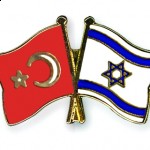 UPDATE 14 January: On Wednesday evening, Israel's Deputy Foreign Minister Danny Ayalon sent a letter of apology to the Turkish Ambassador to Israel, Ahmet Oguz Celikkol. Ayalon wrote: "The disputes between Israel and Turkey will be solved in a respectful and mutual manner between the two governments. There was no intention to humiliate the ambassador personally. I apologize for the way Israel's protest was presented."UPDATE 1655 GMT: Another twist in the tale, according to Haaretz:
UPDATE 14 January: On Wednesday evening, Israel's Deputy Foreign Minister Danny Ayalon sent a letter of apology to the Turkish Ambassador to Israel, Ahmet Oguz Celikkol. Ayalon wrote: "The disputes between Israel and Turkey will be solved in a respectful and mutual manner between the two governments. There was no intention to humiliate the ambassador personally. I apologize for the way Israel's protest was presented."UPDATE 1655 GMT: Another twist in the tale, according to Haaretz:
The Turkish media reported Wednesday that Ankara has recalled its ambassador to Israel on Wednesday after Jerusalem said it would not issue a second, formal apology for Deputy Foreign Minister Daniel Ayalon's treatment of the Turkish envoy.
"This is the final decision on the matter," said a senior Foreign Ministry official earlier Wednesday. The decision was made during consultations between the Foreign Ministry and the Prime Minister's Office, officials said.
Turkish ambassador to Israel Ahmet Oguz Celikkol will depart at 10:30 A.M. on Thursday. It is unclear when, or if, he will return.
On Tuesday, Ankara called in the Israeli Ambassador to Turkey, Gabby Levy, to clarify the statement of Israel's Deputy Foreign Minister Danny Ayalon's, "The Turks are the last ones who can preach morality to Israel." The message was clear: Turkey wanted a public apology from Ayalon.
Israel: Gideon Levy “Only Psychiatrists Can Explain Its Behaviour”
Israel-Palestine: War or Dialogue With Hamas?
Relations had been inflamed when Turkey's Ambassador, Ahmet Oguz Celikkol, had been received in Israel's Parliament, the Knesset, with the press taking pictures of him sitting "lower" than Ayalon. Indeed, those pictures were taken as Celikkol waited outside the meeting room. Ayalon then said: "I won't apologize. It's the Turks who should --- for what [Turkish Prime Minister Recep Tayyip] Erdogan said and for the television series [allegedly slandering Israeli officials and denigrating the Israeli flag]....We are merely setting boundaries."
However, the tension seems to be ebbing. Until late Tuesday, Ankara was sending messages to West Jerusalem that measures would could be taken if Ayalon did not offer an apology, but Prime Minister Benjamin Netanyahu stood behind his Deputy Foreign Minister.
Then Celikkol was recalled to Ankara. Turkish Foreign Minister Ahmet Davutoglu said that it was not possible to continue dialogue with Israel.
The Jerusalem Post alleged that Celikikol might not return.
Why the shift?
Criticisms over Ayalon's "undiplomatic manner" were increasing, as even many officials in Ayalon's party, Israel Beiteinu, said the incident would greatly harm his chances of succeeding party head Avigdor Lieberman as Foreign Minister."He is finished politically," an Israel Beiteinu official said. "This ruins his reputation as a diplomat. It is a stain that cannot be erased. He damaged Lieberman and first and foremost himself."
Labor MK Daniel Ben-Simon called upon Netanyahu to summon Ayalon to his office and put him on a low chair "so he will see how low Israeli diplomacy has stooped." The Minister of Industry, Trade and Labor Binyamin Ben-Eliezer said, "We have enough problems with the Muslim world without picking a fight with a country that has 72 million Muslims."
And Ayalon's behaviour elevated the possibility that Lieberman was trying to torpedo Defense Minister Ehud Barak's scheduled meeting to Turkey next week, in particular preventing Ankara from mediating Israel's peace talks with Syria. "We get the sense that Lieberman wants to heat things up before Barak's visit," a senior Foreign Ministry source said. "All of the recent activities were part of Lieberman's political agenda."
With the moves of the last 24 hours, Netanyahu has checked Lieberman's and attempted to give a "positive" image to the world while maintaining concerns over Turkey's regional manoeuvres.
Netanyahu said: "Turkey is consistently gravitating eastward to Syria and Iran rather than westward [over the last two years]. This is a trend that certainly has to worry Israel."
 Saturday, January 30, 2010 at 8:01
Saturday, January 30, 2010 at 8:01  On Friday, speaking at the International Institute of Strategic Studies in London, Turkish Foreign Minister Ahmet Davutoglu said that Ankara is ready to mediate talks between Israel and Syria:
On Friday, speaking at the International Institute of Strategic Studies in London, Turkish Foreign Minister Ahmet Davutoglu said that Ankara is ready to mediate talks between Israel and Syria: Ahmet Davutoglu,
Ahmet Davutoglu,  Gaza,
Gaza,  Israel,
Israel,  Syria,
Syria,  Turkey in
Turkey in  Middle East & Iran
Middle East & Iran  Ahmet Davutoglu,
Ahmet Davutoglu,  Gaza,
Gaza,  Israel,
Israel,  Syria,
Syria,  Turkey in
Turkey in  Middle East & Iran
Middle East & Iran 



 On Friday, U.S. Secretary of State Hillary Clinton and Mideast special envoy George Mitchell will meet Egyptian Foreign Minister Ahmed Aboul Gheit, Egyptian intelligence chief Omar Suleiman, and Jordanian Foreign Minister Nasser Judeh.
On Friday, U.S. Secretary of State Hillary Clinton and Mideast special envoy George Mitchell will meet Egyptian Foreign Minister Ahmed Aboul Gheit, Egyptian intelligence chief Omar Suleiman, and Jordanian Foreign Minister Nasser Judeh.